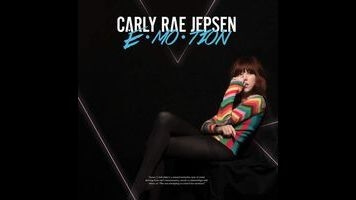Carly Rae Jepsen lands her romantic, ’80s-pop daydream

Despite ruling the summer of 2012 with the inescapable “Call Me Maybe,” Carly Rae Jepsen still feels like an underdog. Perhaps it’s because the Canadian Idol veteran’s music lands squarely on pop’s outskirts, never quite fitting in anywhere. The chart success of both “Call Me Maybe” and her squeaky-clean Owl City collaboration “Good Time” were anomalies: Despite being critically adored, her second studio album, 2012’s Kiss, barely made a cultural dent.
Of course, the upside to not quite fitting in is having more creative freedom, which is something Jepsen takes full advantage of on Emotion. Working with an army of collaborators—ranging from chart Svengalis Sia, Shellback, and The Cardigans’ Peter Svensson to electropop whizzes Ariel Rechtshaid, Vampire Weekend’s Rostam Batmanglij, and Blood Orange’s Dev Hynes—she crafts a dynamic homage to all things ’80s. Unlike Kiss, which focused on upbeat tunes swirled with digital gloss, Emotion has a more sophisticated, deliberately electro feel.
The slow jam “All That” boasts sparkly keyboards and ghostly bass slap, while standout “Boy Problems” is neon-hued new wave sass, and “Making The Most Of The Night” is dazzling dance pop. Both the title track and “Let’s Get Lost” (whose ’80s sitcom-theme saxophone line is quite impressive) hew toward bubblegum R&B/pop. Even the album’s darker, contemporary-sounding tracks—such as the marble-edged “L.A. Hallucinations,” which has the taffy-pulled tempos of Robyn’s best work, and the breathy, Weeknd-esque seduction “Warm Blood”—have a distinctly retro edge.
Credit for this vibe goes to Jepsen’s voice, which has the vulnerable timbre and malleable style of ’80s pop starlets. However, Emotion is also lyrically classic. Although things veer into clichéd territory on “All That,” the album otherwise tends to focus on the magic of love connections—a passionate meeting between long-distance daters, the heart-fluttering hope that a crush reciprocates romantic feelings, and tentative (or even forceful) declarations of adoration. Even Emotion’s cloudier moments also end up optimistic: The protagonist of “L.A. Hallucinations” scorns the fame she once embraced, (“Buzzfeed buzzards and TMZ crows / What can I say that you don’t already know?”) while the title track’s main character gently taunts an ex that he won’t be able to forget her.
Yet for all its utopian romantic talk, Emotion is a remarkably self-aware record. The lead of “Boy Problems” fully admits it’s annoying to be talking incessantly about her relationship issues, while on “When I Needed You,” Jepsen contemplates what she might need to do to rekindle a relationship, but ultimately decides changing for someone else isn’t worth it. These songs ensure the album has subtle bite, which again separates Jepsen from the pop music pack. If there’s any justice, Emotion will propel her to superstardom—but even if it doesn’t, she can at least rest easy knowing she made one of 2015’s most interesting, effervescent records.